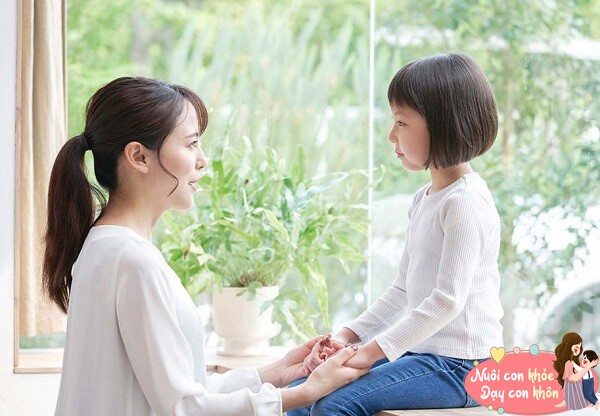There is a perception that constantly scolding children will affect their brain development. Research has shown that yelling and anger from parents can cause fear, leading to long-term negative impacts on children’s psychological health and brain development.


Does constant scolding affect children’s brain development?
Research from Yale University has found that being scolded constantly can have a profound impact on children’s brains, particularly the function of the prefrontal cortex, which is responsible for regulating emotions, and the amygdala, which is related to stress responses.
When children are exposed to negative emotions over a long period, their brains release excessive amounts of cortisol (the stress hormone), affecting the normal development of the hippocampus and prefrontal cortex.
Chronic overproduction of cortisol can also make children more prone to anxiety and depression.

The study found that constant scolding can have a significant impact on children’s brains.
However, the key point is “constant violent scolding”, and the conditions that need to be met are: Being frequent and violent in nature.
When children accidentally hear yelling, they will immediately feel scared and threatened, and their brains will go into a state of stress. But when the negative stress is released, the brain will gradually return to normal. So, it’s okay for parents to show firmness occasionally, as long as it’s not too severe.
However, experts remind parents not to use physical punishment or verbal abuse to discipline their children. The best environment is to try to keep the interaction with children positive, and fill the family atmosphere with love, support, and understanding.

Effects on Children’s Behavior and Emotional Well-being
Psychologist Jo Daugherty’s research shows that children will experience short-term mood changes when scolded, becoming timid and insecure. However, if parents can engage in reparative interactions afterward and explain the reason for the emotional outburst, children will learn to cope and deal with negative emotions from this interaction.
In simple terms, repairing the relationship with the child after scolding is crucial to addressing the negative impacts.

Constant scolding can make children timid and insecure.
This is similar to a “parent-child emotional bank account”. The relationship between parents and children is like a savings account. Positive and close interactions are like deposits. By maintaining this type of relationship, parents are essentially saving and withdrawing less, which helps to stabilize and strengthen the bond.
Renowned psychologist John Gottman’s research on couple relationships has provided useful insights: only when the ratio of positive to negative interactions is greater than 5:1 can the relationship maintain stable and healthy development.
This discovery applies not only to marital relationships but also provides an important reference for parents and children.

3 Steps to Help Parents Reconnect with Their Children After Scolding
Regulate Your Own Emotions and Avoid Self-Blame
When you lose control of your emotions, try deep breathing to calm down.
While ensuring the child’s safety, temporarily remove yourself from the situation for a few minutes to avoid further escalation. Give yourself time to relax, accept your emotions, and press a “pause button” on your feelings.
In reality, no parent is perfect, and everyone makes mistakes. So, during emotional outbursts, patience is often limited, making it challenging to respond and interact positively.
There are 3 steps to help parents reconnect with their children.
When choosing to calm down and physically distance yourself from your child for a short time, be honest and express your emotional state to your child.
For example: “I’m very angry right now and need to step away for a moment to calm down.”
“It’s not your fault; I just need some time to regulate my emotions.”
This type of communication can soothe emotions and help children understand that your anger is not their fault. It also reduces their fear and insecurity.
Apologize to Your Child Promptly and Explain Your Reasoning
Validation and openness are crucial in any relationship.
Once you’ve calmed down, promptly apologize to your child, explain why you scolded them, and discuss how to resolve the issue. Timely apologies can make children feel respected and valued, fostering more positive reactions to your emotional adjustments.
Research has found that parents who can express their emotions and explain their behaviors honestly when apologizing reduce children’s guilt and teach them to face their own emotional outbursts with integrity in the future.
After apologizing, explain why you were angry. It’s important for children to understand that your anger was a response to their behavior.

Apologize to your child promptly and explain your reasoning.
For example: “I’m so sorry for raising my voice earlier.”
“I was very angry because you didn’t put away your toys, and I was worried that we might not wake up on time for school tomorrow.”
This way, children can understand the issue and realize that your emotions were a reaction to the circumstances, not a rejection of them.
Next, discuss with your child how to solve the problem, giving them back a sense of control over their lives.
For example: “I still want you to put away your toys. Let’s think of ways to remind each other.”
Hug Your Child and Reaffirm Your Love Through Physical and Verbal Affection
Clinical psychologist Stone Kraushaar mentions in his book, “Hugging Therapy”, that hugs can increase oxytocin levels in the body. Oxytocin is a hormone associated with feelings of happiness, calmness, and trust.
Often referred to as the “love hormone,” oxytocin strengthens bonds, reduces stress, and alleviates anxiety. When parents hug their children, both parties experience closeness and warmth, creating a safe space for the child to relax and feel loved.
After communicating and apologizing, give your child a hug. Hugs are not just a gesture of affection but also a way to convey the message that everything will be alright and that you are there for them.
“The First Eight Years: Nurturing Your Child’s Character Development”
“Don’t worry if you can’t build a house yet; focus on building yourself first. Investing in self-improvement will save you a fortune in the long run, and the results will be well worth the wait. The first eight years of a child’s life are crucial, so parents must prioritize accompanying their children during this formative period.”





































